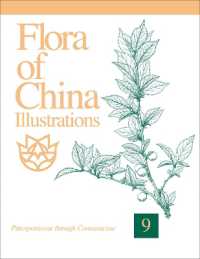Full Description
Decolonising the curriculum is not a one-size-fits-all approach. In the case of higher education, each discipline needs to tailor the decolonising approach to their unique context and subject area needs. United by a shared responsibility for dismantling colonial legacies in higher education curricula, the authors of this edited collection reflect on ways they have embedded innovative grassroots efforts to navigate power and knowledge to transform curricula. Featuring authors from a range of disciplines including architecture, business, biology, computer science, criminology, education, finance, history, international relations, literature, physics, and visual arts, the collection provides the reader with a rare opportunity for cross-disciplinary learning. Authors share their ideas, tools, and experiences as they manoeuvre through a state of liminal transformation towards a decolonised future for higher education.
Topics include curricular design, classroom arrangements, impactful assessments, library support, pedagogical racism, restorative practices, research funding, research methodologies, and the degree awarding gap. The book aims to support readers at different stages of the decolonising university curricula journey, including those in the early stages and those who are looking to develop and deepen their practice. Examining the importance of decolonising curricula in a post-colonial and globalised world, Innovations in Decolonising the Curriculum: Multidisciplinary Perspectives is for all who are keen to move 'decolonising the curriculum' from debate to action in higher education.
Contents
Chapter 1. Decolonising the Higher Education Curriculum: Engaging with Liminality; Anamika Twyman-Ghoshal, Omar El Masri, Adeela ahmed Shafi, Samuel Robert Copland, and Acheampong Charles Afriyie
Part One. The Foundations of Decolonising
Chapter 2. Decolonising Knowledge: Start at the Beginning; Adeela ahmed Shafi
Chapter 3. Thermodynamic wisdom: Decolonising thermodynamics in the undergraduate physics curriculum; Wilson Poon
Part Two. The Journey of Decolonising
Chapter 4. Decolonising International Relations: Teaching with historical context and non Western theories; Samantha Louden-Cooke and Natalie Jester
Chapter 5. Towards a Decolonial Curriculum: Prevent, Communities of Inquiry, and the Global Politics of Knowledge; Alison Scott-Baumann and Duaa Jamal Karim
Chapter 6. The Tree of Architecture Revisited, Rethought, and Rejected: Decolonising Architectural Education; Yvette Putra
Chapter 7. Decolonising Business Schools; Acheampong Charles Afriyie and Samuel Robert Copland
Chapter 8. Decolonising American Literature: Reflections on Readings, Postgraduate Research, and Praxis; Jessica Mure
Chapter 9. Addressing the false neutrality of computing in computing education; Jordan Allison
Chapter 10. Teaching the Science of Race and Racism; Kevin N Lala, Jasmeen Kanwal, and Kalyani Twyman
Chapter 11. Endeavours and Experiences of Decolonising the Criminology Curriculum; Anamika Twyman-Ghoshal, Omar El Masri, and Billy Dalton
Chapter 12. Cooking Up Assignments Together: Illustrators Approach Decolonising the Studio-Classroom; Kimberly Ellen Hall and Tom Spooner
Chapter 13. Decolonising History Beyond the Curriculum: Student participation and the local lens towards a 'reparative history'; Christian O'Connell
Part Three. The Collective Responsibility of Decolonising
Chapter 14. Decolonising HEIs: Start at the Top; Adeela ahmed Shafi
Chapter 15. One Size Does Not Fit All; Acheampong Charles Afriyie, Samuel Robert Copland, and Adeela ahmed Shafi
Chapter 16. Towards a Decolonised Future for Higher Education; Anamika Twyman-Ghoshal, Adeela ahmed Shafi, Omar El Masri, Samuel Robert Copland, and Acheampong Charles Afriyie







